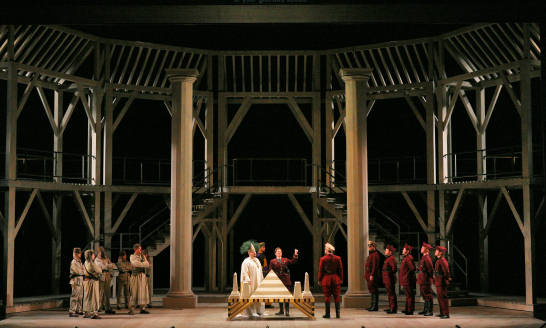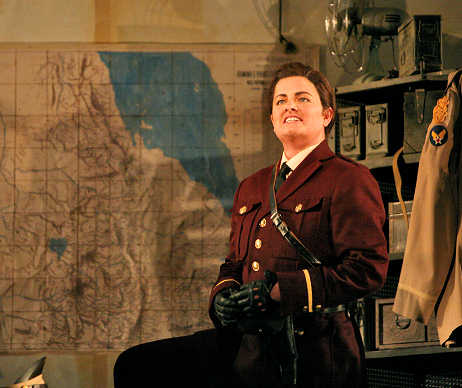Other Links
Editorial Board
- Editor - Bill Kenny
- London Editor-Melanie Eskenazi
- Founder - Len Mullenger
Google Site Search
SEEN
AND HEARD INTERNATIONAL OPERA REVIEW
Glimmerglass Opera Festival 2008 (1)
Handel, Giulio Cesare in Egitto: (New production):Soloists,
orchestra, and chorus of Glimmerglass Opera,
Conductor: David Stern,
Michael MacLeod, General and Artistic Director, Cooperstown, New
York 23.8.2008 (LS)
Production:
Director: Robin Guarino
Sets:John Conklin
Costumes:Gabriel Berry
Lighting:Robert Wierzel
Fight Direction:Philipp E. Thurman
Projected Titles:Kelley Rourke
Cast:
Giulio Cesare: Laura Vlasak Nolen
Curio: Paul La Rosa
Cornelia: Lucia Cervoni
Sesto: Aurhelia Varak
Cleopatra: Lyubov Petrova
Tolomeo: Gerald Thompson
Achilla:Jonathan Lasch
Nireno: Anthony Roth Costanzo
Violinist: Sue Rabut

Giulio Cesare was hurriedly composed by Handel in 1724 to
bail out the struggling Royal Academy of Music. The Royal Academy
had been formed five years earlier as a stockholding venture to
provide opera in London. At first all went well, but a tour by the
company to France followed by two disappointing productions
threatened to destroy the venture. Fortunately, Giulio Cesare
proved to be a great success and the Royal Academy remained afloat.
In 1946, the eminent opera historian Herbert Weinstock praised
Giulio Cesare as a "deeply moving and incessantly interesting
opera." He went on to say: "Had we but the singers today…there is
no reason to foresee that a scrupulous revival of Giulio Cesare
would not succeed with the true musical public and at the same time
please general opera-going audiences as much as Gluck's Orfeo ed
Euridice."
And indeed during the last sixty years, Giulio Cesare has
emerged from the past and has become relatively popular. This review
of it will be the fourth in Seen and Heard during the past
two years.
The Glimmerglass production, even with some cuts, lasted three and
one half hours including two intermissions. The music and singing,
with few exceptions, were magnificent. And unlike other relatively
static Handel productions, the audience was treated to a fast paced
music drama with only a little of what I call "freneticism". All
too soon the performance ended.
The plot of Giulio Cesare is bizarre and bears no
resemblance to history or to Shakespeare's play. As the curtain
rises Cesare, Cornelia, wife of Pompeo and Sesto, their son, are
discussing ways to make peace with the renegade Pompeo. Tolomeo's
general Achilla appears with gifts for Cesare. One of the gifts is
none other than Pompeo's head. Cesare is furious. How dare the
Egyptians interfere in the affairs of Rome? Cornelia is now a rich
widow, and Curio seeks to wed her. Sesto swears to avenge his
father's death.
Meanwhile Cleopatra plans to seduce Cesare and with his army topple
her brother Tolomeo from the throne. She disguises herself as
Lydia, an Egyptian maid, and (wouldn't you know it?) Cesare falls in
love with Lydia. Cesare and Tolomeo meet in the royal palace and
instantly dislike each other. Sesto and Cornelia burst in seeking
revenge, and are thrown into prison. Tolomeo tries to seduce
Cornelia. She rebuffs him and contemplates suicide. Sesto is
released from prison by the sympathetic Nireno and comforts his
mother. Cornelia is then put into Tolomeo's harem. Cleopatra meets
Cesare and in the midst of a love duet, Curio tells them that
there is a plot to kill Cesare. Cleopatra reveals her true self
and tells Cesare to flee. He says he will defend himself but
unfortunately his efforts fail. He is captured and Cleopatra who is
also captured thinks that he is dead. All looks lost but Achilla
switches his allegiance from Tolomeo to Cesare. Cesare escapes from
Tolomeo into the sea, and manages to swim to safety and with
Achilla's troops captures the palace. Cornelia again refuses
Tolomeo's advances, and Sesto slays Tolomeo. The opera ends with
general rejoicing as Cesare and Cleopatra declare their eternal
love.

Laura Vlasak Nolen as Giulio Cesare
Current productions of Giulio Cesare use modern settings, and
Glimmerglass was no exception. The stage was a replica of the
Shakespearean Globe Theatre leaving little room for formal scenery.
Within these constraints some wonderful effects were created. As the
curtain rose the audience found itself viewing a field headquarters
tent somewhere in the North African desert during the late 1930s or
early 1940s (El Alamein perhaps?). Instead of the Germans battling
the British, the Italians were taking on the Egyptians. When Laura
Vlasak Nolen entered in her sharp uniform and black boots she looked
like a junior Il Duce. The opera was off to a good start.
In the penultimate scene we are at the royal palace in which a
large table model containing pyramids, obelisks, and columns
dominates the set. We see Tolomeo played by the counter tenor
Gerald Thompson with his retinue. The casting of Thompson was pure
brilliance, for the combination of his figure, mannerisms, and voice
produced the antithesis of what one would normally associate with a
powerful King Tolomeo. Cesare confronts Tolomeo and it is clear
that relationships between them will not go well, particularly as
Cesare casually knocks over pieces of the grand architectural model
during his defiant aria. Tolomeo's efforts to restore the pieces to
their correct positions were hilarious.
Laura Vlasak Nolen was a very believable Cesare as she strutted on
stage and became smitten by the sexy Cleopatra. She sang with beauty
and passion, and the audience responded with much applause. Her
credits include Waltraute in Die Walküre at the Metropolitan
Opera, Tisbe in Cenerentola at the Spoleto Festival, Malcolm
in La Donna del Lago at the New York City Opera, and Pierotto
in Linda di Chamounix at the Caramoor festival.
Lyubov Petrova, Cleopatra, was introduced as suffering from a cold.
Happily there was little evidence of that, and as the opera
progressed her singing became more confident and effective,to which
the audience, onceagain, responded warmly. One of her costumes
featured a deep décolletage, and archeologists in the audience may
have wondered whether they were going to be seeing the famous
topless Minoan snake goddess (they didn't). Petrova has sung Norina
in Don Pasquale and Pamina in The Magic Flute at the
Metropolitan Opera; the title role in Lucia Di Lammermoor and
Gilda in Rigoletto at Washington National Opera as well as
other proncipal roles Pittsburgh and Atlanta Opera, Palermo
and Angelica at the Palau de les Arts in Valencia.
Gerald Thompson, Tolomeo, displayed a very beautiful counter tenor
voice together with very effective acting. Not surprisingly,
the audience was very enthusiastic about him too. His credits
include singing the same role at the Metropolitan Opera,
Prince Orlofsky in Die Fledermaus and Unulfol in Rodelinda
at San Francisco Opera and Portland Opera and Guido in
Flavio at New York City Opera.
Lucia Cervoni as Cornelia, was a member of the 2008 Young American
Artists program. Her mezzo voice was very good, but more projection
would have made her performance even more effective. She has sung
Suky Tawdry in the Beggar's Opera, Tessa in Trinity,
Carmen in the Tragedy of Carmen, and Mrs. Grose in The Turn
of the Screw.
Aurhelia Varak's Sesto was sung and acted with great force and
competence. She has appeared as Meg Page in Falstaff with
Renato Bruson, The Mother in Hansel and Gretel at Rome Opera
and the female protagonist in the world premiere of Vacchi's Il
Letto Della Storia in Florence's Teatro del Maggio Fiorentino.
The other members of the large cast, Paul La Rosa, Jonathan Lasch,
and Anthony Roth Costanzo all sang very well too.
The Glimmerglass Orchestra, conducted by David Stern, was
excellent. Particular mention should be made of Concertmaster
Sue Rabut's, excellent violin obligato in "Flower in the Meadow" and
Gabriel Kovach's excellent horn playing in the spectacular aria "The
Hunter Seeks his Prey". Herbert Weinstock commented that Handel's
use of four horns in this opera was unusual if not unique and they
certainly enhanced a wonderful production.
Having seem two fine operas, Giulio Cesare and I Capuleti -
within two days, my wife and I happily returned to Boston hoping to
visit Glimmerglass again next year.
Lew Schneider
Pictures © Cory Weaver/Glimmerglass Opera
Back
to Top
Cumulative Index Page
